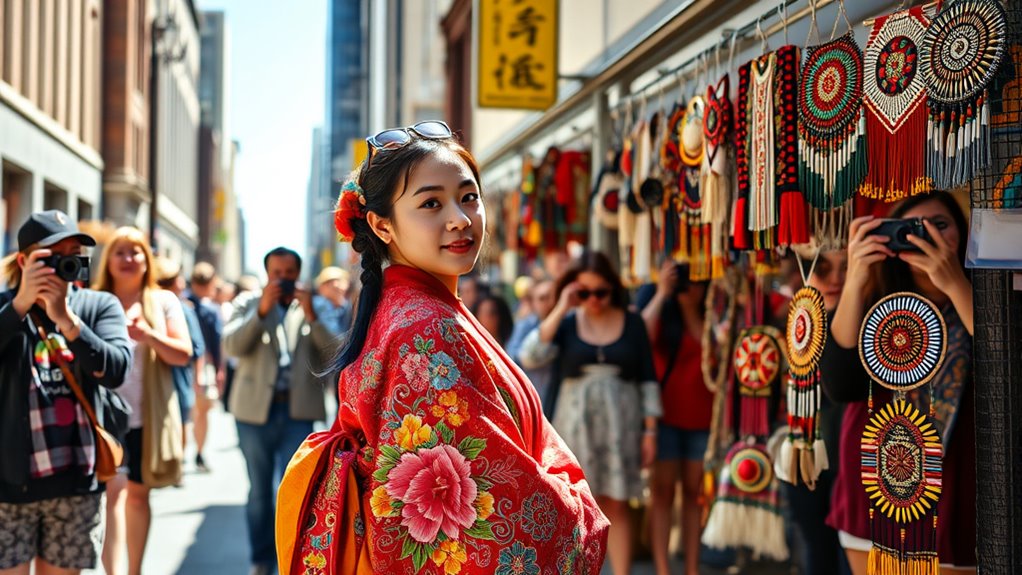The line between cultural appreciation and appropriation lies in respect and understanding. When you honor traditions by learning their significance and supporting authentic creators, you’re appreciating. However, if you use cultural elements superficially or without knowledge, especially as trends or costumes, you risk disrespecting these cultures. To navigate this line ethically, focus on mindful engagement and ask yourself if your actions genuinely honor or just superficially borrow. You’ll discover more ways to be respectful as you explore further.
Key Takeaways
- Cultural appreciation involves respectful learning and sharing, while appropriation often lacks understanding or regard for significance.
- The intent behind cultural use determines if it’s appreciation or appropriation; respect and acknowledgment are key.
- Superficial adoption of cultural symbols without context or permission crosses into appropriation.
- Engaging with cultures through authentic support and education fosters appreciation versus exploitation.
- Recognizing power imbalances and sacred meanings helps distinguish respectful appreciation from harmful appropriation.

Understanding the difference between cultural appropriation and appreciation is essential in today’s interconnected world. When you engage with cultures different from your own, it’s easy to mistake genuine respect for superficial copying. Cultural exchange, when handled with care, fosters understanding and connection rather than exploitation. It’s about learning, sharing, and honoring traditions without stripping them of their meaning or significance. Artistic respect plays a key role here. If you want to celebrate another culture through fashion, music, or art, you need to approach it thoughtfully. This means researching the origins of the symbols or practices you’re interested in and acknowledging their roots. It’s about giving credit where it’s due and not just using cultural elements as trendy accessories.
Respect cultural roots and approach traditions with care to foster genuine understanding and appreciation.
When you participate in cultural exchange with artistic respect, you’re actively listening and learning from members of that culture. This can involve attending cultural events, supporting artisans, or simply educating yourself about the history behind certain styles or traditions. By doing so, you avoid the pitfalls of appropriation—taking cultural elements out of context and using them without understanding or permission. For example, wearing a traditional headdress as a costume without recognizing its sacred significance can be deeply disrespectful. But if you wear it as part of a cultural celebration with acknowledgment and appreciation, it’s a different matter altogether.
Respectful cultural exchange also involves recognizing power imbalances. Often, cultural appropriation happens when dominant groups adopt elements from marginalized communities without sharing the benefits or acknowledging the origins. When you approach cultural sharing with humility, you’re less likely to perpetuate harm. This might mean supporting authentic creators or learning about a culture’s history from reliable sources. It’s about fostering genuine relationships and understanding rather than just copying for aesthetic appeal or personal gain.
Additionally, understanding the importance of vertical storage solutions and organized presentation can help cultivate a respectful attitude toward cultural elements by ensuring they are displayed thoughtfully and meaningfully. Ultimately, artistic respect and cultural exchange are about intention and awareness. When you actively seek to understand the deeper meaning behind cultural elements, you contribute to a more respectful and inclusive environment. It’s not about erasing differences but celebrating them thoughtfully. By doing so, you help build bridges rather than walls, ensuring that cultural appreciation uplifts communities rather than exploits them. Recognizing where the line is requires honesty and ongoing reflection. When you prioritize respect and understanding, you’re more likely to navigate this complex terrain ethically and meaningfully.
Frequently Asked Questions
How Can Individuals Educate Themselves on Cultural Sensitivities Effectively?
You can educate yourself on cultural sensitivities by actively seeking out reliable educational resources, such as books, documentaries, and articles that explore different cultures. Engage with diverse voices and listen to personal stories to build empathy. Attend workshops or cultural events to gain firsthand experience. Stay curious and open-minded, and always question your assumptions. This approach helps you develop genuine cultural sensitivity and respect, avoiding harmful stereotypes or misunderstandings.
Are There Specific Examples of Cultural Appreciation That Are Universally Accepted?
Did you know that many cultural festivals celebrate traditional garments, fostering appreciation rather than appropriation? For example, wearing traditional attire during cultural festivals, with respect and understanding, is often seen as appreciation. These acts promote cultural exchange and learning. Such practices are generally accepted when approached genuinely, showing respect for the origins and significance of traditional garments, making them a positive way to honor diverse cultures.
What Role Does Power Dynamics Play in Cultural Appropriation Debates?
You should consider how power dynamics influence cultural appropriation debates, where cultural dominance and privilege imbalance often play a significant role. When someone from a position of privilege adopts elements from a marginalized culture, it can reinforce existing inequalities. Your awareness of these dynamics helps you understand why some actions are viewed as disrespectful, highlighting the importance of respecting cultural origins and acknowledging privilege in these interactions.
How Can Brands Ensure Respectful Cultural Representation in Marketing?
Ever wondered how your brand can genuinely honor cultures? Start by embracing cultural exchange instead of superficial trends. Engage authentically with communities through respectful collaboration, listening to their stories and perspectives. Research deeply, avoid stereotypes, and seek guidance from cultural experts. When your intent is sincere, your marketing becomes a bridge of understanding, not appropriation. This approach ensures your message resonates respectfully, fostering trust and meaningful connections.
Is It Ever Appropriate to Wear Cultural Attire as a Costume?
When considering if it’s appropriate to wear cultural attire as a costume, you should reflect on its cultural significance and historical context. If you’re doing it just for fun without understanding or respecting its meaning, it can be offensive. However, if you genuinely appreciate and honor the culture, educating yourself beforehand, it’s more acceptable. Always ask yourself if your actions honor or diminish the culture’s true significance.
Conclusion
Remember, maneuvering cultural boundaries is like walking a tightrope in a world still figuring out its Wi-Fi connection—tricky but essential. Whether you’re donning a kimono or grooving to Afrobeat, ask yourself if you’re truly honoring the culture or just borrowing its vibe. It’s not about being a 21st-century Marie Antoinette, but about respecting origins. Keep the dialogue open, stay humble, and aim for genuine appreciation—before you accidentally become a cultural Marie Kondo, decluttering someone’s heritage.










